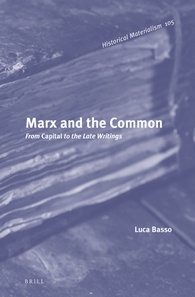Luca Basso, University of Padua
In Marx and the Common, Luca Basso provides a detailed reconstruction of the late Marx’s connection of the collective dimension of communism and the element of individual realisation. Through an original analysis of a vast range of Marx’s writings – from Capital to his political texts and scientific notes – the author brings out an articulated historical-theoretical landscape in which the notion of ‘individual’ is intertwined with the ideas of ‘class’, ‘society’ and ‘community’. Rooting his analysis in the revolutionary power of the workers’ ‘acting in common’, Basso brings to the fore an anthropological dynamic in Marx, irreducible to either liberal individualism or any kind of organicist approach.
Biographical note
Luca Basso, Ph.D. (2004) University of Pisa, studied in Padua and in Berlin. He is Professor of Political Philosophy at the University of Padua. His previous works include Agire in comune. Antropologia e politica nell’ultimo Marx (ombre corte, 2012), and Marx and Singularity: From the Early Writings to the Grundrisse (Brill, 2012). He is also the editor of the special issue “Republic and Common Good in Leibniz’ Political Thought”, in Studia Leibnitiana (Vol. 43:1, 2011).
Readership
All interested in the thought of Karl Marx and the political significance of the research he conducted in the latter part of his life.
Table of contents
Introduction
1. Fetishism and Subjects: Between Reality and Mystification
2. Ethnology and Forms of ‘the Common’
3. Individual separation
4. Subjectivity and Class: The Space of Politics
Conclusion
References
Index

